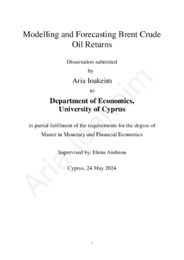Modelling and Forecasting Brent Crude Oil Returns

View/
Date
2024-05Author
Ioakeim, AriaAdvisor
Andreou, ElenaPublisher
Πανεπιστήμιο Κύπρου, Σχολή Οικονομικών Επιστημών και Διοίκησης / University of Cyprus, Faculty of Economics and ManagementGoogle Scholar check
Keyword(s):
Metadata
Show full item recordAbstract
This dissertation was produced as a component of the "Monetary and Finance Economics" postgraduate program at the University of Cyprus. Its primary objective is to examine the time series data of weekly returns on crude oil prices to forecast their future fluctuations. The study proposes a methodology for predicting oil returns movements utilizing the Box-Jenkins approach, a widely recognized method in time series analysis. The Box-Jenkins methodology involves the identification, estimation, and diagnostic checking of a suitable autoregressive integrated moving average model for the time series data.
In addition to the theoretical framework, the study will also include empirical validation of the forecasting model using historical crude oil price data. A theoretical overview is presented, elucidating the crude oil concept and its significance within the global market and financial domain. Subsequent chapters delve into empirical analysis, employing suitable methods to effectively model and forecast crude oil returns. Specifically, autoregressive moving average (ARMA) models and hybrid models within the Generalized Autoregressive Conditional Heteroscedasticity (GARCH) family are constructed utilizing the statistical software EViews 9. By comparing the forecasted values with actual returns movements, the model's performance will be evaluated, thereby contributing to the practical applicability of the Box-Jenkins methodology in the context of crude oil returns forecasting. By shedding light on the predictability of oil returns and the factors driving their movements, this study aims to provide valuable insights that can aid in risk management and strategic planning in the energy and financial sectors.
